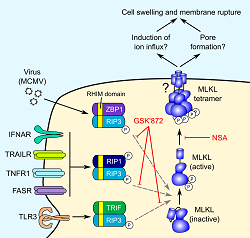
Programmed cell death pathways can be activated as a defence mechanism in cells infected with viruses to reduce further viral spread. These pathways can be either necroptotic (which trigger local inflammatory responses) or apoptotic (which are non-inflammatory), but both can be targeted by viral inhibitor proteins. Final-year CIMR PhD student Alice Fletcher-Etherington in the Weekes lab, together with other colleagues have published in PNAS on how human cytomegalovirus (HCMV) can subvert host cell death pathways to enhance its cellular infectivity. From proteomic screens, this new paper shows how the HCMV protein pUL36 targets MLKL, a key human cell regulator of necroptosis, for proteasome degradation. This mechanism is combined with pUL36’s anti-apoptotic action, making it a ‘dual-death inhibitor’ and a potential target for anti-HCMV therapy.

